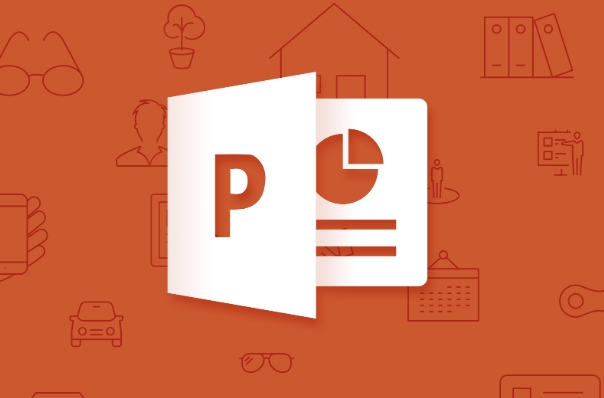How to make a looping video background in a PPT?
Aug 01, 2025 am 06:59 AMInsert the video via Insert tab and resize to cover the slide, preferably in MP4 format. 2. In Playback tab, enable "Play in Background", set start to "Automatically", check "Loop until Stopped" and optionally "Hide During Show", then send video to back. 3. To apply across slides, either copy-paste the video with settings to each slide or use one long slide in kiosk mode. 4. Optimize playback by using H.264 MP4 at matching resolution, minimizing file size, and testing in Slide Show mode, as looping works best on desktop versions.

Making a looping video background in PowerPoint is totally doable and works great for presentations with a dynamic feel—like kiosks, trade shows, or creative pitches. Here’s how to set it up properly:

? 1. Insert Your Video into the Slide
- Open your PowerPoint presentation.
- Go to the Insert tab.
- Click Video > Video on My PC (or "From File" depending on your version).
- Select your video file (MP4 is recommended for compatibility).
- The video will appear on the slide—resize and position it to cover the entire background (drag the corners to fill the slide).
? Tip: Use a video without sound or mute it to avoid distractions.
? 2. Set the Video to Play in the Background
- Click the video to select it.
- Go to the Playback tab (appears when the video is selected).
- In the Video Options group:
- Check "Play in Background" — this makes the video play automatically and minimizes its visual controls.
- Set "Start" to "Automatically" (so it starts without a click).
- Check "Loop until Stopped" — this makes the video repeat continuously.
- Optionally, check "Hide During Show" so the video doesn’t show selection borders in presentation mode.
? Pro tip: For a true background effect, make sure the video is behind all other content. Right-click the video > Send to Back > Send to Back.

? 3. Apply to Multiple Slides (Optional)
PowerPoint doesn’t natively support video across multiple slides, but here are two workarounds:
Option A: Use the Same Video on Multiple Slides
- Copy the video from the first slide (Ctrl C).
- Paste it (Ctrl V) onto other slides.
- Repeat the playback settings on each slide.
- This gives the illusion of a continuous loop across slides.
Option B: Use One Long Slide (for kiosks)
- If you're using kiosk mode, keep everything on one slide and use triggers or animations.
- This way, the video loop runs uninterrupted.
? 4. Optimize for Smooth Playback
- Use MP4 format with H.264 compression — it’s the most compatible.
- Keep video resolution close to your slide size (e.g., 1920x1080) to avoid lag.
- Avoid large file sizes — compress if needed using tools like HandBrake or online converters.
- Test in Slide Show mode (F5) to confirm it loops smoothly.
Final Notes
- Looping works best in PowerPoint desktop apps (Windows/Mac). Online or mobile versions may not support background looping.
- If the video stutters, consider using a subtle animated GIF or looping screen recording as a fallback.
Basically, just insert, set to loop and autoplay, send it behind content, and test. It’s not flashy, but it works — especially when you want that sleek, professional loop without third-party tools.

The above is the detailed content of How to make a looping video background in a PPT?. For more information, please follow other related articles on the PHP Chinese website!

Hot AI Tools

Undress AI Tool
Undress images for free

Undresser.AI Undress
AI-powered app for creating realistic nude photos

AI Clothes Remover
Online AI tool for removing clothes from photos.

Clothoff.io
AI clothes remover

Video Face Swap
Swap faces in any video effortlessly with our completely free AI face swap tool!

Hot Article

Hot Tools

Notepad++7.3.1
Easy-to-use and free code editor

SublimeText3 Chinese version
Chinese version, very easy to use

Zend Studio 13.0.1
Powerful PHP integrated development environment

Dreamweaver CS6
Visual web development tools

SublimeText3 Mac version
God-level code editing software (SublimeText3)

Hot Topics
 Detailed steps to create text with chalk font effect in PPT
Mar 26, 2024 pm 04:50 PM
Detailed steps to create text with chalk font effect in PPT
Mar 26, 2024 pm 04:50 PM
1. If you want to get a good-looking effect, you can match the PPT with the corresponding [blackboard] background image. 2. First create the materials for [Chalk Lettering]. Draw a shape in [Insert]-[Shape], any shape can be used, fill it with black. 3. Copy the drawn shape and paste it as a [picture]. 4. Delete the drawn shape and set the [Artistic Effect] of the pasted picture to [Line Drawing]. 5. In [Artistic Effect]-[Artistic Effect Options], reduce [Transparency] and increase the value of [Pencil Size]. 6. [Picture Tools]-[Color]-[Set Transparent Color] Set the transparent color to black. 7. In】Set picture format【-】Picture color【Recolor picture】【. 8. In the ppt page, insert a [text box] and enter text. 9. Complex
 How to remove the date that appears automatically when printing from PPT handouts
Mar 26, 2024 pm 08:16 PM
How to remove the date that appears automatically when printing from PPT handouts
Mar 26, 2024 pm 08:16 PM
1. Let me first talk about the method I used at the beginning, maybe everyone is using it too. First, open [View]——]Remarks Template[. 2. A place where you can actually see the date after opening it. 3. Select it first and delete it. 4. After deleting, click [Close Master View]. 5. Open the print preview again and find that the date is still there. 6. In fact, this date was not deleted here. It should be in the [Handout Master]. Look at the picture below. 7. Delete the date after you find it. 8. Now when you open the preview and take a look, the date is no longer there. Note: In fact, this method is also very easy to remember, because the printed handouts are handouts, so you should look for the [Handout Master].
 Introduction to the method of inserting heptagons into PPT slides
Mar 26, 2024 pm 07:46 PM
Introduction to the method of inserting heptagons into PPT slides
Mar 26, 2024 pm 07:46 PM
1. Open the PPT slide document, and in the [Outline, Slide] column on the left side of the PPT, click to select the slide where you want to insert the basic [shape]. 2. After selecting, select the [Insert] menu in the function menu bar above the PPT and click. 3. After clicking the [Insert] menu, the [Insert] submenu bar pops up below the function menu bar. Select the [Shape] menu in the [Insert] submenu bar. 4. Click the [Shape] menu to pop up the preset shape type selection page. 5. In the shape type selection page, select the [Heptagon] shape and click. 6. After clicking, move the mouse to the slide editing interface, press the mouse to draw, and release the mouse after the drawing is completed. Complete the insertion of the [heptagon] shape.
 How to insert excel icons into PPT slides
Mar 26, 2024 pm 05:40 PM
How to insert excel icons into PPT slides
Mar 26, 2024 pm 05:40 PM
1. Open the PPT and turn the page to the page where you need to insert the excel icon. Click the Insert tab. 2. Click [Object]. 3. The following dialog box will pop up. 4. Click [Create from file] and click [Browse]. 5. Select the excel table to be inserted. 6. Click OK and the following page will pop up. 7. Check [Show as icon]. 8. Click OK.
 How to deal with blanks when playing PPT slides
Mar 26, 2024 pm 07:51 PM
How to deal with blanks when playing PPT slides
Mar 26, 2024 pm 07:51 PM
1. Open the PPT file you created and select the second slide. 2. On the second slide, select one of the pictures, and then select [Animation] to add any animation effect. 3. In the start column of the animation bar, change [While Standalone] to [After Previous Animation], and you will see that the picture animation label [1] will change to [0]. Do the same for subsequent slides, and you can see the effect by playing the slide at the end.
 Restricted processing operation method is prompted when embedding fonts in PPT
Mar 26, 2024 pm 08:41 PM
Restricted processing operation method is prompted when embedding fonts in PPT
Mar 26, 2024 pm 08:41 PM
1. Open PowerPoint and edit the PPT document. 2. Find the font that cannot be embedded, select the text box, right-click - Cut/Copy. 3. Right-click the blank space of the slide and select [Paste] - Paste as picture. 4. It is simple and convenient to save the font as a picture, but the font cannot be modified. Method 2: Software FontCreatorProgram 1. Download the FontCreatorProgram software from the Internet, unzip the file, and select the [FCP.EXE] file to install. 2. Open the installed software, click [File] - Open - Installed Fonts in the window menu bar, and select PPT. For fonts that cannot be embedded, click [OK]. 3. Select [
 Detailed method of inserting formula effect flow chart into PPT
Mar 26, 2024 pm 04:36 PM
Detailed method of inserting formula effect flow chart into PPT
Mar 26, 2024 pm 04:36 PM
1. Open PPT, click the [Insert] tab, and click the [smartArt] button in the [Illustrations] group. 2. Click [Process] in the [Select smartArt graphics] dialog box that opens. 3. Select the [Formula] flow chart in the [Process] pane that opens. 4. Click [OK], and the [Formula] flow chart will be inserted into the slide pane. 5. Click [Text] in the [Type text here] column, or click [Text] on the graphic to enter content. 6. Select the shape in the graphic, click the [Design] tab of [smartArt Tools], and click the [Add Shape] button in the [Create Graphics] group to add a shape. 7. The shapes in the graphics can also be selected and deleted. Of course, you can also delete them in smar as needed.
 How to create underline animation when mouse clicks text in PPT
Mar 26, 2024 pm 06:40 PM
How to create underline animation when mouse clicks text in PPT
Mar 26, 2024 pm 06:40 PM
1. Enter text. 2. Select the shape under Insert and select Line within it. 3. Draw a straight line below the word love. 4. Select the straight line, then select the animation menu, and choose an animation effect from it. 5. Play the animation. At this time, there are no horizontal lines under the text. 6. Click the mouse, and a horizontal line will appear under the text.







